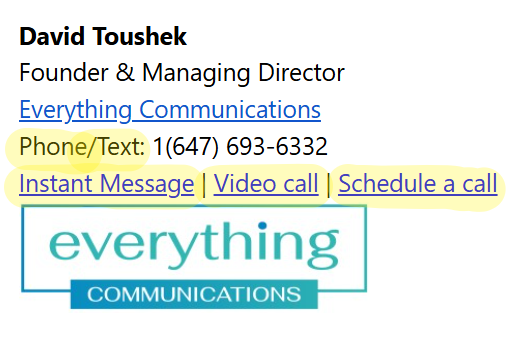Nobody needs to use a tech broker to buy software. You can waste weeks researching who the best players are, calling around to various vendors to get “qualified”, hounded, and worked through their sales processes; see their demos; sift through the BS; create your short lists; negotiate based on what you feel might be possible; and finally choose your vendor and hope for the best.
That is the normal tech buying process and it’s been very effective in creating the situation many companies find themselves in where they have way too much software that doesn’t fully meet their needs, isn’t fully deployed the way it could be, and has low user adoption.
Or you can enlist the help of a trusted Tech Broker who takes the time to understand your actual business needs, and works to help ensure success in your most critical factors.
An experienced broker can take weeks of work off your plate while ensuring you:
- Truly meet the needs of your employees and customers
- consider things the vendors may not be telling you
- save money!
Save time and money, and better meet the needs of your staff and customers –and all for FREE?!! Yes. Read on…
Top 10 Reasons You Should Use a Tech Broker
In today’s rapidly evolving business landscape, having the right technology can play a crucial role in driving employee and customer experiences (and ultimately revenue and profit).
When it comes to CommTech in particular, the right tech can make a significant difference in how connected, and engaged your employees and customers are– which directly impacts the most important facets of your business: morale, customer satisfaction, productivity, efficiency, sales, and profit.
However, when it comes to procuring software, companies have a new option: Should they buy directly from vendors or enlist the expertise of a technology broker? Let’s explore the benefits of utilizing a technology broker and why it can be a game-changer for companies like yours.
1. Your Tech Broker Works For You!
Every business has unique requirements and goals, and as your technology partner our job is to know your business and help you find the right technology at any given time.
Just like a good travel or real estate agent, a good tech broker is there for you. Yes they make a commission but not unless they help you meet your needs. Similarly a tech broker is less focused on the immediate commission they’ll receive from the vendors than the long term value of the relationship with you their valued client.
A good broker is always thinking long term and will be there for their clients (and you their buyers –whichever company you may work at) for years to come. They care more about those relationships and ensuring they’re helping you achieve the results you’re looking for, than simply making a quick sale to meet their quarterly quota like your typical random sales rep at a SaaS company.
2. Prioritize What Matters Most
If buying technology isn’t your primary job, then you’ve got many other priorities on your list. In addition to all the things on your plate, your team and customers are counting on you to manage your priorities well and to help them get what they need in order to be as productive and effective as possible.
As the image above illustrates, that is not an easy task when you’ve got so many competing priorities. What’s more important, customer experience or executive preference? Satisfying executives, or truly meeting the needs of your employees? Pleasing the CFO with superior short term cost savings, or fully considering the true cost of total ownership compared to the free software that the VP of IT recommends? Job security or higher CSAT?
An outside party without all of the encumberences of internal loyalties and politics can help your company objectively analyze and prioritize your most critical needs and bring you recommendations that most completely match. They can also help you defend why one solution is objectively better than another based on the most important goals.
Your technology broker can help you navigate and negotiate all of these competing priorities, and save you time, money and a lot of stress!
3. Understand Your Unique Needs
Technology brokers have the ability to assess a company’s needs and recommend tailored solutions that align with its specific objectives. Being more consultative in nature they’ll work with you to wholistically understand the root problems in your organization and how particular technologies may or may not prove valuable based on your environment. For instance, one technology may have all the best features and may be a very popular choice, but if your organization doesn’t have the resources to properly deploy such technology and create all of the requisite integrations you may not even use half of those features and might have been better off with something that cost 30% less.
Your tech broker understands your business dynamics and can provide trusted advice. It’s like taking your car enthusiast friend to help you buy a car. You may be emotionally attached to a particular brand or feature, or charming sales person but your friend is not. They have no vested interest other than helping to ensure you make the best choice for your family. Their job isn’t to help you buy a car, their job is to help you assess your needs and desires and make the best choice.
4. Follow the Rapidly Changing Market
The technology landscape is vast and complex, with countless software options available. Keeping up with the latest trends, features, and pricing models can be a daunting task and with the arrival of advanced AI and GPT power the landscape is changing almost daily. Chat GPT, AI powered chat, live agent chat –these 3 things alone can fill weeks of your team’s time in research.
This is where technology brokers excel.
As a tech broker our main job is to keep abreast with changing technologies and help you navigate the various options. We possess an in-depth understanding of the market, constantly evaluating various software solutions and staying up-to-date with emerging technologies. By leveraging our expertise, companies can tap into a wealth of knowledge and make informed decisions.
5. Save Significant Time, Energy, and Stress
Think about the last time you bought software and how time consuming it was. Let’s highlight a few of the key steps:
Do as much research as you can fit into your busy schedule and contact the most seemingly appropriate vendors. Hope you haven’t missed out any important vendors (you probably have) and begin reaching out to each vendor. After several days of back and forth and dealing with forms, SDRs, and getting “qualified” to speak with an “Account Executive” you may finally get to share some of what you’re looking for (assuming they give you much chance to speak). Several weeks of dragging you through their sales process and they’ll be pressuring you to sign before their quarter end –whether you’re ready or not.
Building and maintaining relationships with software vendors can be time-consuming and challenging for companies. Technology brokers act as a bridge, connecting businesses with a diverse network of reputable vendors. These established connections allow brokers to negotiate favorable terms, secure competitive pricing, and access exclusive offers. By capitalizing on our extensive networks, companies can save time, reduce costs, and gain a competitive advantage in the market.
6. Negotiate the Best Pricing
Negotiating software contracts requires a deep understanding of licensing agreements, pricing structures, and service-level agreements. Once again your technology broker who handles these calls and vendors on the regular are there to ensure that their clients get the best possible deal.
With our inside experience and knowledge, brokers can identify potential pitfalls, negotiate favorable terms, and advocate for their clients’ best interests. This expertise can result in substantial cost savings and enhanced contract terms, providing a significant return on investment.
7. Ensure a Great Implementation
Your desire isn’t to buy technology. Your desire is to reap the benefits and gain the outcomes the technology makes possible. But that only comes through proper implementation, enablement and training; and once the deal is done, your sales rep is focusing on what they’re paid and measured on: closing the next deal.
Deploying new software can be a complex process, involving installation, configuration, data migration, and employee training. Technology brokers assist in streamlining these implementation efforts by leveraging their experience and established relationships with vendors. They work to ensure a seamless transition, minimizing disruption to daily operations and maximizing the benefits of the software. Furthermore, brokers can provide ongoing support and serve as a single point of contact for any issues that arise, saving companies valuable time and resources.
8. Continuously Evaluate and Optimize
Technology is ever-evolving, and what works today may not be as effective tomorrow. Technology brokers don’t just stop at the initial software procurement; they provide continuous evaluation and optimization of solutions to ensure they remain aligned with business goals. They monitor market trends, update clients on new developments, and recommend upgrades or alternative solutions when necessary. By engaging with a technology broker, companies can stay ahead of the curve and leverage the latest advancements.
9. Avoid Costly Mistakes
Perhaps the greatest value an advisor brings is to help ensure critical outcomes are met and to avoid catastrophic mistakes that can set your business back significantly.
By challenging their customer’s thinking, something internal employees often hesitate to do –especially when it comes from an executive, a skilled and trusted broker can play a crucial role. Operating in a consultative and advisory capacity, they can effectively accelerate success and minimize setbacks, acting as catalysts for desired outcomes while safeguarding against potential pitfalls.
They provide a critical buffer between the various stakeholders ensuring that tough issues are raised and addressed head on so that mistakes are avoided down the road.
10. Save Money!
Last but certainly not least, saving money is a huge reason to enlist the help of a technology broker. There are numerous ways you can save money including:
- time spent evaluating needs
- time spent researching potential matches
- time spent ensuring wholistic fit with the rest of your tech stack, the wholistic needs of your company, and where technology is going next.
And on top of all this, a tech broker will often not charge you for their services as they likely get paid commission by the technology vendors they represent. That’s certainly the case here at Everything.
Conclusion
In an era where technology drives success, companies cannot afford to make uninformed decisions when it comes to software procurement. Utilizing a technology broker brings numerous benefits, including market expertise, tailored recommendations, a diverse network, expert negotiation skills, streamlined implementation, ongoing support, and continuous evaluation. By leveraging the services of a technology broker, companies can make well-informed choices that align with their strategic objectives and gain a competitive edge in today’s dynamic business landscape. Check out our endorsements and contact us today to discuss how we can help you!





